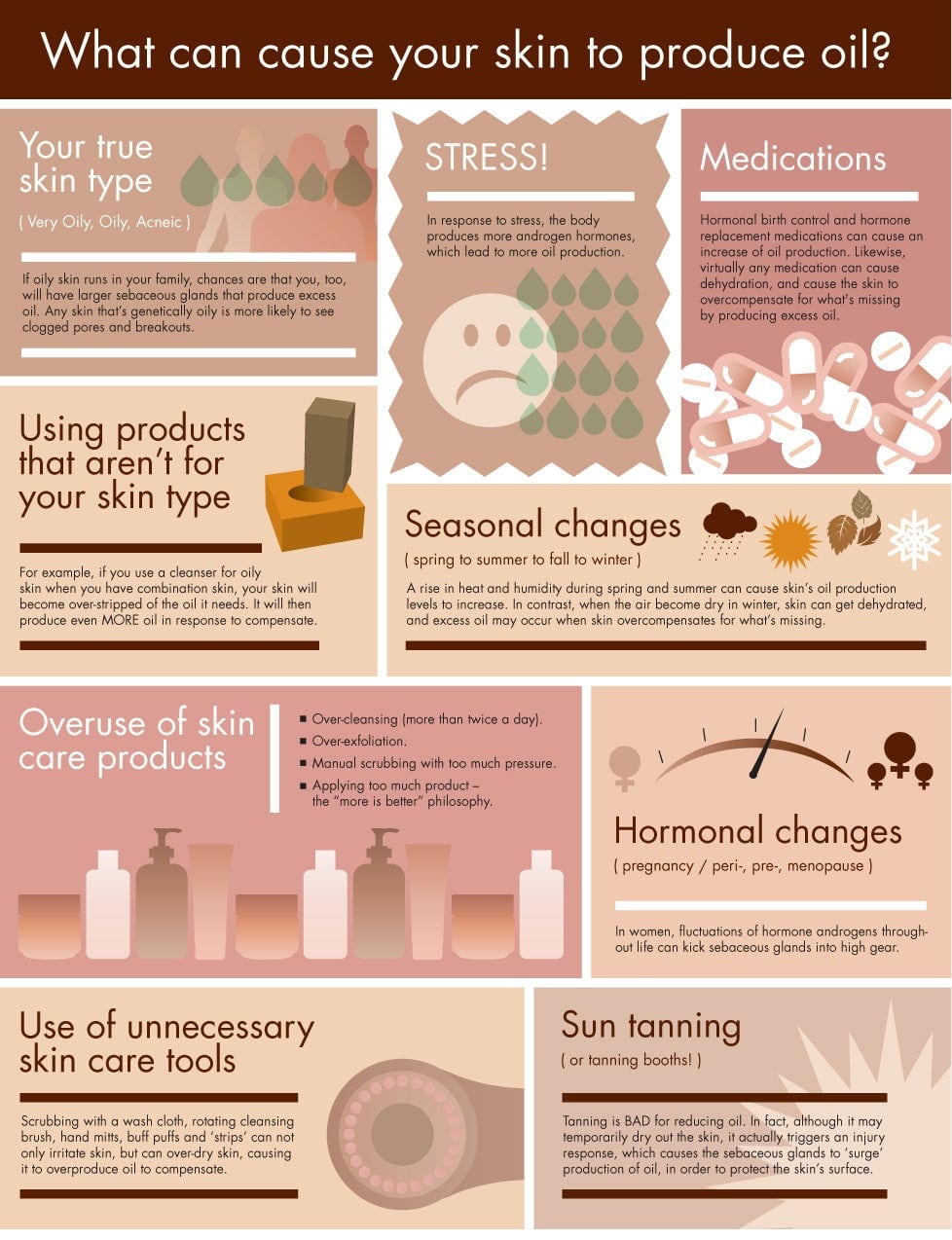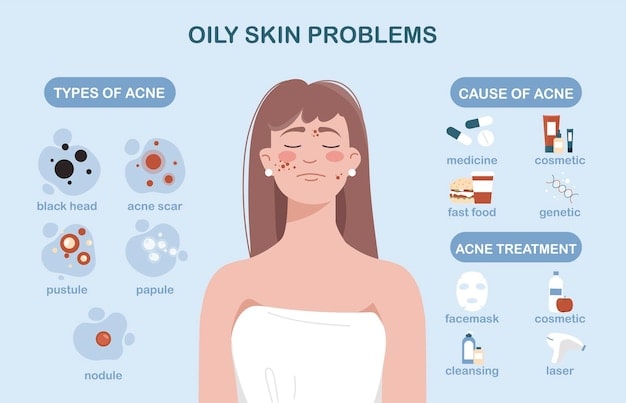Are you tired of dealing with oily skin? Our website offers expert advice, tips, and product reviews to help you achieve a clearer, more balanced complexion. Our team of skincare experts provides credible information and practical solutions to help you tackle common oily skin problems, such as acne, shine, and clogged pores. Discover effective skincare routines and product recommendations tailored to your skin type. Say goodbye to oily skin woes and hello to a confident, radiant you.
Expert Tips for Clearing Up Oily Skin and Achieving a Healthy Glow
I. Introduction

Oily Skin And Achieving A Healthy Glow
Did you know that over 50% of people have oily skin? Oily skin can be frustrating to deal with, often leading to shine, acne, and clogged pores. If you're one of the millions of people dealing with oily skin, you're not alone. That's why we've created this comprehensive guide to help you understand oily skin and how to manage it effectively.
In this article, we'll cover the causes of oily skin, the best treatments, and tips for prevention. Our team of skincare experts has curated this guide to provide you with the most credible and practical information available. Whether you're a skincare novice or a seasoned pro, we're confident that you'll find the insights and tips you need to achieve a clearer, healthier complexion. Let's dive in!
II. Understanding Oily Skin
Oily skin is a common skin condition that affects people of all ages and genders. It occurs when the sebaceous glands in the skin produce an excess amount of sebum, which is the natural oil that keeps the skin hydrated and healthy. When the sebum production is excessive, it can lead to oily skin and a variety of related issues, such as acne, enlarged pores, and blackheads.

Understanding Oily Skin
There are different types of skin, including normal, oily, dry, and combination skin. Oily skin is characterized by an overproduction of sebum, which can result in a shiny, greasy appearance. Dry skin, on the other hand, lacks sebum and can result in flakiness and tightness. Combination skin is a mix of both oily and dry skin and can be more challenging to manage.
Oily skin can have a significant impact on a person's overall health and appearance. It can lead to acne, which can cause scarring and affect a person's self-esteem. Oily skin can also result in enlarged pores, blackheads, and whiteheads, which can be difficult to treat. Additionally, oily skin can increase a person's risk of developing skin infections and other health problems.
Understanding the causes and effects of oily skin is the first step to managing it effectively. By following a proper skincare routine and making lifestyle changes, you can keep your oily skin under control and achieve a clear, healthy complexion.
III. Tips for Managing Oily Skin
If you're struggling with oily skin, don't worry – there are several practical steps you can take to manage it effectively. By using the right products, adjusting your diet, and avoiding certain behaviors, you can keep your skin looking healthy and clear. Here are some tips to get you started:

Tips For Managing Oily Skin
- Use the Right Skincare Products: Choose skincare products that are specifically designed for oily skin, such as oil-free cleansers, toners, and moisturizers. Look for products that contain ingredients like salicylic acid, benzoyl peroxide, and alpha-hydroxy acids, which can help to control oil production and prevent breakouts.
- Avoid Overwashing: While it may be tempting to wash your face frequently, overwashing can actually make your oily skin worse. Stick to washing your face twice a day, using a gentle cleanser, to avoid stripping your skin of its natural oils.
- Watch Your Diet: Certain foods, such as dairy, fried foods, and sugary drinks, can contribute to oily skin. Consider making dietary adjustments, like increasing your intake of fruits and vegetables, lean proteins, and healthy fats.
- Keep Your Hands Off Your Face: Touching your face can transfer oil and bacteria to your skin, leading to breakouts. Try to avoid touching your face as much as possible, and if you must, make sure to wash your hands thoroughly first.
- Use Blotting Papers: Blotting papers are an easy way to remove excess oil from your skin throughout the day. Keep a pack with you and gently blot your skin whenever you start to feel oily.
By following these tips, you can effectively manage your oily skin and achieve a clear, healthy complexion. Remember to be patient and consistent with your skincare routine, and don't hesitate to consult with a dermatologist if you're struggling to manage your oily skin.
IV. Common Myths About Oily Skin
There are many misconceptions about oily skin, and it can be difficult to separate fact from fiction. Here are some of the most common myths about oily skin, along with the truth behind them:

common-myths-about-oily-skin
Myth #1: Oily skin is caused by poor hygiene.
Truth: Oily skin is not caused by poor hygiene. In fact, washing your face too frequently or using harsh, stripping cleansers can actually make oily skin worse. Oily skin is caused by an overproduction of sebum, which is the natural oil produced by your skin.
Myth #2: People with oily skin shouldn't use moisturizer.
Truth: People with oily skin should absolutely use moisturizer, but it's important to choose the right one. Look for lightweight, oil-free moisturizers that won't clog your pores. Moisturizing can actually help to balance your skin's oil production and prevent breakouts.
Myth #3: Oily skin ages more slowly than dry skin.
Truth: There is no evidence to support the idea that oily skin ages more slowly than dry skin. In fact, oily skin can lead to the formation of fine lines and wrinkles, just like dry skin can. The key to preventing premature aging is to use sunscreen and avoid smoking and excessive sun exposure.
Read more: Dry Skin SOS: Understanding the Causes and Symptoms
Myth #4: Oily skin doesn't need to be exfoliated.
Truth: Exfoliating can be beneficial for oily skin, but it's important to do it properly. Choose a gentle exfoliant that won't irritate your skin, and use it no more than once or twice a week. Exfoliating can help to remove dead skin cells and unclog your pores, which can prevent breakouts.
By understanding the truth behind these common myths about oily skin, you can make informed decisions about how to care for your skin. Remember to rely on research and credible sources, and don't hesitate to consult with a dermatologist if you have any concerns about your skin.
When To See A Doctor
If you have oily skin, you know how frustrating it can be to manage. Oily skin is caused by an overproduction of sebum, the natural oil produced by your skin. This excess oil can clog pores and lead to acne, blackheads, and other skin problems.

When To See A Doctor
While oily skin is common, it can sometimes be a sign of an underlying health issue. If you're experiencing severe or persistent oily skin, it's important to know when it's time to see a doctor.
Here are some signs that you should make an appointment with a dermatologist:
Your skin is extremely oily, to the point where it's uncomfortable or affecting your daily life.
You're experiencing frequent breakouts or acne.
Your skin is inflamed, red, or swollen.
You've tried over-the-counter treatments without success.
Your oily skin is accompanied by other symptoms, such as hair loss, weight gain, or fatigue.
When you see a doctor for oily skin, they will likely perform a thorough examination of your skin and ask you about your medical history. They may also order blood tests or other diagnostic tests to rule out any underlying health issues.
Treatment for oily skin may include topical or oral medications, lifestyle changes, or other interventions depending on the cause of your symptoms. Your doctor will work with you to develop a treatment plan that's tailored to your specific needs.
Remember, if you're experiencing persistent or severe oily skin, it's important to seek medical attention. With the right treatment, you can manage your oily skin and improve your overall skin health.
V. Conclusion
In conclusion, oily skin can be frustrating to manage, but with the right approach, it's possible to keep it under control. It's important to understand the causes of oily skin and to debunk common myths that may be preventing you from achieving a healthy, balanced complexion. By using the right products, adjusting your diet, and avoiding harmful behaviors, you can manage oily skin and improve your overall health and appearance.
Remember, everyone's skin is different, so it may take some trial and error to find the approach that works best for you. Don't hesitate to consult with a dermatologist if you have persistent problems with oily skin.
We hope that the tips and information provided in this article have been helpful to you. If you have any other tips or insights on managing oily skin, we encourage you to share them in the comments section below. And for more information on skin care and beauty, be sure to check out our other articles.
References:
- American Academy of Dermatology Association. (2020). Oily Skin: Diagnosis, Treatment, and Outcome.
https://www.aad.org/public/diseases/a-z/oily-skin-treatment - National Institute of Arthritis and Musculoskeletal and Skin Diseases. (2021). Healthy Skin Matters.
https://www.niams.nih.gov/health-topics/skin-care/healthy-skin-matters

